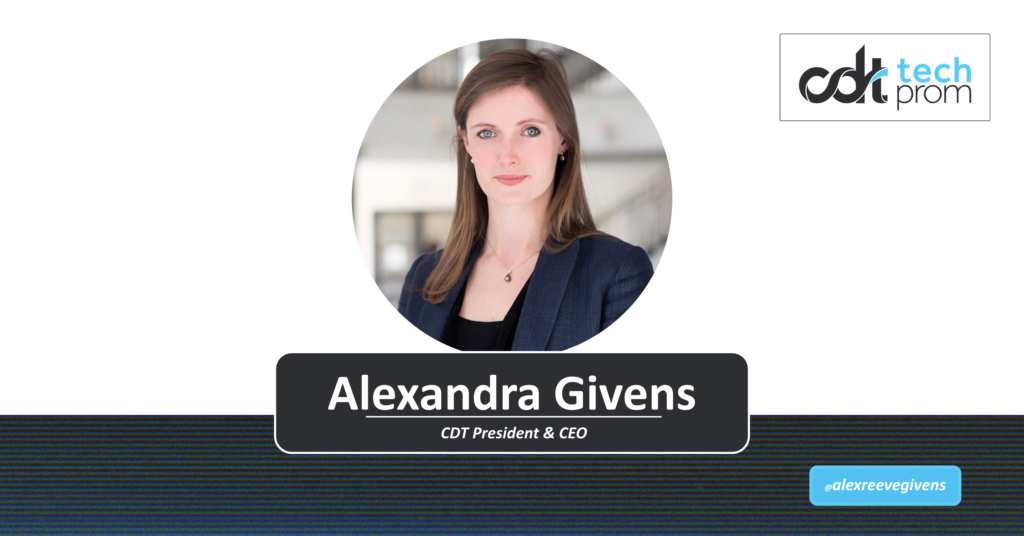CDT CEO Alexandra Givens’ 2021 Tech Prom Remarks

The Center for Democracy & Technology’s annual fundraiser, fondly known as “Tech Prom,” happened on October 20, 2021.
The remarks below are a lightly edited transcript of CDT CEO Alexandra Givens‘ remarks.
****
Thank you Travis!
It is such a gift to be here and to see all of you — and to see all of the friends joining us virtually as well.
When we began planning this event over a year ago, we ambitiously styled it as a “reunion”, hoping the pandemic might be behind us and we’d be gathering without concern. Of course, that hope has proven elusive. We’re still in a time of global tragedy, and rethinking, each day, what the new normal will be.
For those of us who work in technology and tech policy, this has been a seismic year for additional reasons. In a time of remote work, remote school, and social distancing, technology has connected us to each other like never before. But we are also grappling, as a society, with the consequences of those connections: of the fundamental inequalities in our digital infrastructure – of what it means to have humanity connected and amplified with all its strengths and all its ugliness –– of how we can live our lives online without sacrificing our privacy, or facing exploitation or discrimination.
At CDT, we’re working hard on these questions from both our U.S. and European offices – and fighting for answers that advance equity, civil liberties, and democratic values.
What does this mean in practice?
We believe in a world where platforms meaningfully address issues like online hate and harassment, while ensuring that reforms to address those problems don’t limit the self-expression that is so central to our democracy, to empowering marginalized voices, and to preserving a vibrant civic space;
We believe in a world where society combats child exploitation and online criminal activity while upholding the essential tool of encryption to protect the privacy and security of human rights advocates, journalists, and oppressed people around the world;
We believe in a world where people can trust that their browsing activity or other data-driven inferences about them won’t make them targets for predatory advertising; subject them to warrantless government surveillance; or impact their standing in school and their ability to gain credit, housing or a job;
We believe in a world of accessible, fair, secure, and trustworthy elections, where we fight for post-election audits that uphold rather than undermine trust in democracy, and we empower election officials and others to effectively combat voter suppression;
We believe in fostering a proactive relationship between civil society, academic researchers and companies to understand these challenges and to accountably address potential harms;
We’re thinking about new models — from ideas like incentivizing interoperability; to new approaches to transparency, explainability and researcher access to data; to bringing greater public visibility into the work of internet standards bodies; to how questions of privacy, content moderation and open access will apply in the world of virtual reality.
We’re making sure that conversations about equity and non-discrimination consider all forms of marginalization, including centering the voices of people with disabilities.
We’re doing this with a commitment to bring legal, technical and academic expertise to the table in a truly integrated way.
We’re doing it with a commitment to focus on real solutions that work in practice.
And we’re doing it with a commitment to learn from, partner with, and amplify voices from the communities most impacted by new technologies.
If you want to learn more about how we’re doing this, I urge you to read our Annual Report, to follow our work online, and to come share ideas with the incredibly smart, passionate, dedicated experts I get to call my colleagues.
But first, I want to acknowledge some of the wonderful people gathered in this room and our virtual room. Going back to our founders Jerry Berman, Janlori Goldman, Deirdre Mulligan, Jonah Seiger, and Danny Weitzner; through the leadership of Jim Dempsey; through my predecessors Leslie Harris and Nuala O’Connor, and most recently Lisa Hayes and Chris Calabrese; through the dozens of former CDTers, the CDT alumni network is an incredible force for good in the world. A number of the people I’ve just mentioned are here tonight and we’re thrilled to be joined by them.
We’re indebted to our remarkable Board, Advisory Council, project advisory committees, Fellows and interns, and to all who regularly participate in CDT’s Working Groups.
To our sponsors and all who are here tonight: we’re deeply grateful to you for supporting our work — for believing in what we’re doing, and for engaging alongside us. We believe deeply in bringing together the different perspectives represented in this room to advance policy and technical solutions that combat exploitation and make technology a force for good.
Cheers!